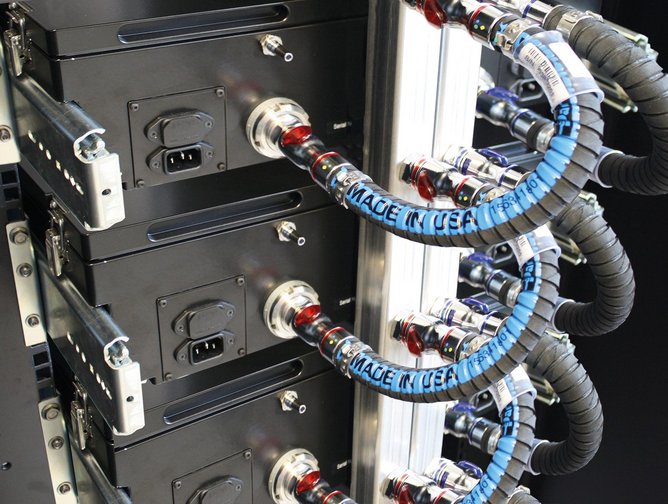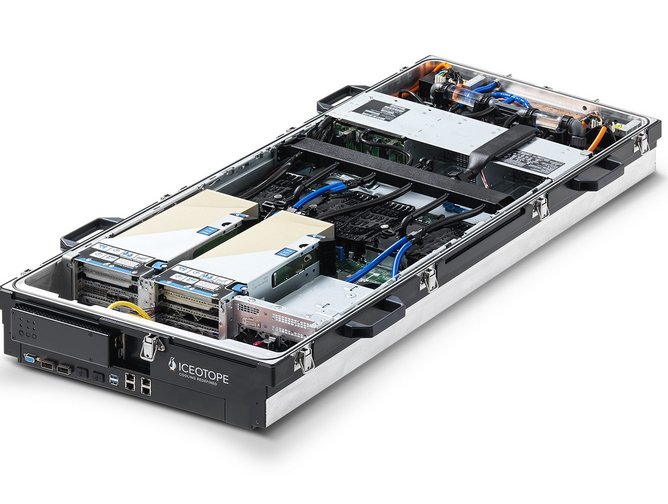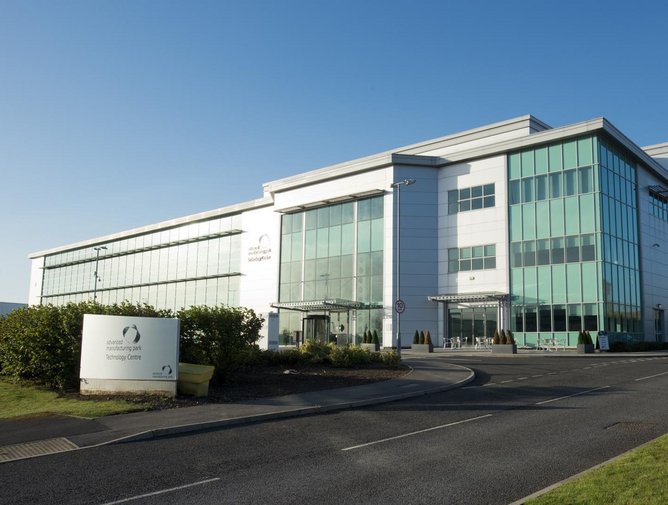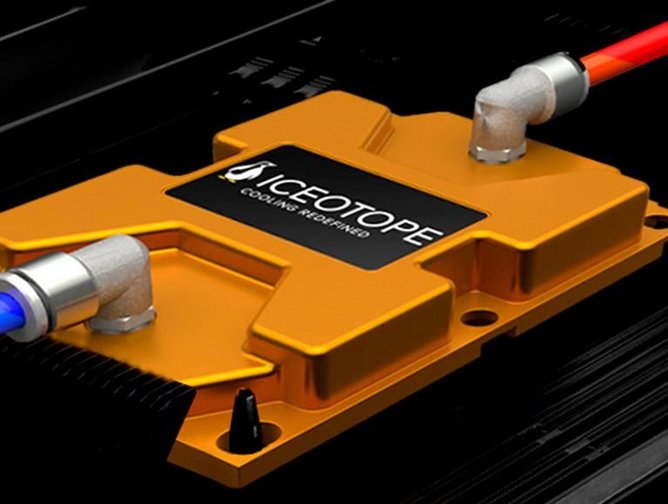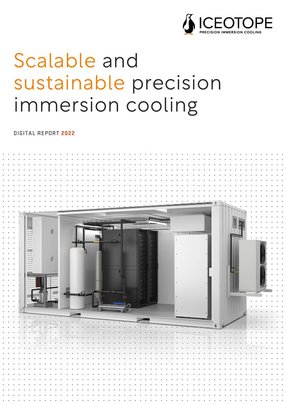Scalable and sustainable precision immersion cooling
The drive towards net-zero CO2 has ignited innovation across every industry sector, but none more so than the world’s data centres.
Today, the dual demands of high performance and improved sustainability standards mean the risks for data centres are higher than ever, as those that do not match the pace of the rest risk being left behind.
In conversation with David Craig, the CEO of Iceotope, we discussed how Iceotope’s cooling technologies offer a long-term, seamless aid to sustainability targets.
Readily scalable, holistic solutions - what Iceotope brings to the cooling market
Iceotope’s precision immersion cooling solutions are a prime example of data centre technologies aligning with the ever-expanding and ever-changing nature of the industry.
“I would describe our difference as: we definitely set out to understand the customer’s problem and create a solution that fits,” says Craig.
“If you look at the liquid cooling space today, there are two very dominant technologies in cold plates and tank immersion. Our approach was to say, ‘This cannot just be a technology; this must be a solution that is scalable and serviceable’.
“So, by being in racks and chassis, we fit customers’ integrator models, and we're incredibly serviceable – actually achieving slightly better serviceability than air cooling.”
Alongside this, the technology also offers a simple, efficient way for data centres to improve their sustainability standards.
“We use a fraction of the raw materials, and we use a fraction of the amount of dielectric coolants – it's cheaper, it's simpler, it's lighter. We don't need to worry about spills, we have superior thermal performance, and we’re able to deliver a better holistic performance to the customer overall.”
Craig explains how Iceotope’s technology makes heat management infinitely easier.
“Today, everything to do with heat in computers is a problem to manage. And actually, adopting our technology removes that altogether, because you're not really cooling anymore. What you're actually doing is capturing heat. So, computers run better, they run in more places, they run more inexpensively, but also, you can do useful things with heat, depending on where you are.
“Fundamentally, what we have done is deliver a scalable, serviceable, deployable solution which – by being able to retrofit and scale down to one, as well as up to many – means that the customer doesn't have to go for this ‘all or nothing’ type of approach.”
For Craig, we are only at the cusp of the change that the data centre industry will witness. He asserts that, in the very near future, the usual quick-fix air cooling methods will not be able to keep pace with the technology being deployed.
“I genuinely think that, in five years’ time, we will be in the midst of an avalanche of change. People will be accelerating towards those more holistic understandings and solutions – and customers will be driving that demand much more significantly.
“The young generation, who really care about sustainability, will be budget holders.”
As the younger generations rise to positions of higher influence, ESG as an industry priority will only increase. By this point, as Craig asserts, the companies that have not successfully met these standards will struggle to survive, simply because they waited too long to innovate.
Sustainability and high performance - the competitive edge of immersion cooling
As you can imagine, an instrumental factor driving Iceotope’s technological innovation is sustainability. Iceotope’s step away from air cooling has allowed it to achieve green standards that knock its competitors out of the water.
“Everything in data centres, today, has been designed to be cooled by air.
“As a result, it's pretty low density and horrifically inefficient – servers typically run at pretty low utilisation rates to prevent them from throttling. So, they use up large amounts of land, as well as huge amounts of electricity and water resources.”
In comparison, Iceotope’s technology can improve environmental performance across a number of key areas.
“If you just think about data centres, if our technology was deployed across the majority of the industry, we would reduce the usage of billions of litres of water. The industry consumes enough water to hydrate 10% of the world's population today – that could be returned to people who could drink it.
“However, the impact becomes broader when you step right outside it. If the whole industry got about 30% more energy efficient, you're dealing with the levels of 50MT-of-carbon-a-year reduction.”
To that end, Iceotope’s technologies deliver sustainable cooling in adaptable, bespoke and highly practical solutions. They offer cooling solutions that can be tailored to meet each site’s specific needs, balancing sustainability with optimal performance.
“We have a whole set of benefits that the technology itself delivers: less space, less cost, less energy, and less water – and people get that.
“The key thing that we do to help is actually engage with, listen to and deliver the solutions that they need, as opposed to saying, ‘This is what we've got, here's your fridge, where would you like it? It’s white’. Instead of trying to bend them to us, we are bending us to them.”
“When you do that, you are much more aligned with the customer. It means that we listen to them, and we adopt their thinking into what we develop.”
The global potential, ready to be unlocked
Improving cooling solutions may sound like a small step, but alleviating the restrictions imposed by air cooling can reap huge rewards. It promises to not only help data centres achieve a more efficient way of operating, but to drive higher performance across countless global industries.
“As businesses start to understand how much cheaper and more effective life can be in a chassis-based liquid cooling world, they will accelerate towards it. You paint a picture of a world in which you are using a quarter of the physical space to do your processing, plus half of the energy and virtually no water.”
Beyond the immediate benefits that this will bring in terms of sustainability and business costs, adopting advanced cooling solutions also has the power to transform the way that data centres are run, modelled and implemented, in an increasingly technologically-advanced world.
“If your processes are completely silent or you're not deafening your staff, you can run data centres in city centres. You can run them on the 33rd floor of an office block. You can transform the type of land that you use – using more brownfield than greenfield – fibre can be where the people are, and the data can be processed as close to people as possible.”
As well as the practical advantages, this shift opens up huge possibilities for data and its utilisation.
“We can accelerate the rate and pace at which we adopt AI and those kinds of technologies. And, if you think about the onset from there, adopting AI in healthcare will massively enhance the rates of survival and early diagnosis; it will massively reduce the amount of time that nurses waste on triage and A&E.”
And that’s just one example. This technology can enhance all industries, expanding their capabilities, increasing their efficiencies and making our vision of smart cities a reality.
“The more that we can transform perceptions of high performance computing from a wacky thing in the corner to a mainstream high performance that’s powering smart cities, autonomous vehicles, advanced healthcare, advanced retail, then you start to really move forward.”
Alongside this, another benefit of Iceotope’s technology is that servers can be made much smaller than conventional air coolants.
“If they're much smaller, they're also much cheaper with fewer precious metals, fewer raw materials, fewer component placements, and fewer inventory movements,” Craig explains.
“Actually, the whole supply chain becomes much simpler and much cheaper, while also adding value and margins back in for those who make the devices.”
Can the data centre industry exist without change?
According to Craig, data centres at large continue to use a completely extractive model.
“Most of what has been done is quite incremental – and that's understandable, because there's a lot of risk in the business; you don't want your data centre to fail or to go down, and changes are expensive.”
“It’s totally understandable that you have that kind of constraint sitting there. But I think this is one of those times that occurs once in a generation, where incrementalism becomes potentially quite dangerous, in the sense of actually what the impact could be on our competitiveness. Because there is no doubt that ESG is going to be a very, very strong factor in the future.”
In short, adopting sustainable technologies is no longer a choice.
“There's a rising generation of people half my age and less, who really passionately care about the environment. They will be making buying decisions and they will be consumers. And I think they will hold greenwashers to account.
The global drive for sustainability – and the responsiveness of the global data centre industry – has effectively set a pace of change. If not followed, data centres are risking nothing less than the future of their business.
“If we stay in this incrementalist, safe world where we're not joining the dots, it's a dangerous place. Joining the dots and grabbing that vision is what the companies who’ll make a serious impact on the future will be playing towards.”
So, as we look to a hugely promising future for data centres and their increasing role within economies, businesses and societies, Craig has high hopes that the demand for innovation will actually make data centres a solution to aid the world’s net-zero targets.
“I really think there is a moral case for growth, but we have to conduct growth in a moral way.
“We have an obligation to go beyond the balance sheet and do these things because they will make fabulous, fabulous differences to our future. So more technology, moving faster, please. And I think that's why those who remain afraid to change will be caught in a set of perfect storms.”
